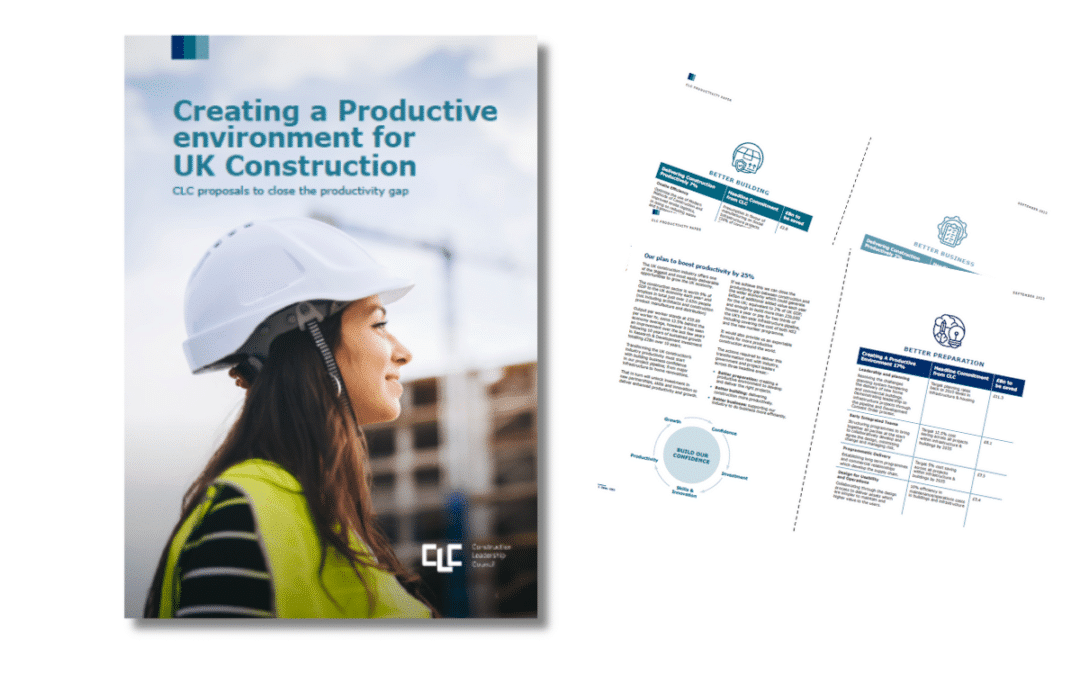
by Clair Mooney | 28 Sep, 2023 | Main News Feed
At its AGM earlier this week, Build UK appointed Julie White, Managing Director of D‐Drill and a member of the Drilling and Sawing Association (DSA), as the new Chair of Build UK. Having grown up in the industry, in the family business which she now owns, Julie is a passionate champion for construction, making regular visits to Downing Street as a member of the former Prime Minister’s Business Council and sharing her views in the national and trade media.
Commenting on her new role, Julie said:
“I’m absolutely delighted to be appointed as Chair of Build UK for the next two years. Having been on the Board since its inception in 2015, I truly believe in the value of having the whole supply chain around the table to develop solutions and provide a strong collective voice for the sector. I can’t wait to get started and use my time and energy to make a difference for this fantastic industry of ours.”
Julie succeeds Paul Cossell who led Build UK since January 2022, overseeing an increase in membership whilst responding to a range of challenges, including the end of COVID‐19 restrictions, record inflation, and the introduction of the new building safety regime.

by Clair Mooney | 28 Sep, 2023 | Building Safety Act, Transformation
Building better: CLC announces plan to boost industry productivity by 25%.
The Construction Leadership Council has today published a new report exploring the potential for the UK industry to transform its productivity, identifying three areas where billions of pounds of savings could be made, or additional value generated for the UK economy.
The analysis explores why average productivity per worker in construction lags 13.5% behind the wider economy and suggests that the introduction of a number of measures – many of them already in the process of delivery – could boost productivity by up to 25%.
For the first time, the report includes a detailed breakdown, issue by issue, of the potential benefits of boosting construction productivity; demonstrating the urgency of the issue and the scale of opportunity on offer if the challenges can be addressed.
The three key focus areas identified by the report are:
- Better preparation: creating a productive environment to develop and deliver projects; through reforming the planning process for housing and major infrastructure projects; showing consistent leadership in project scope, creating more effective delivery teams, improving supply chain relationships and more collaborative working during the design process; delivering a potential 17% productivity boost and £30bn in annual value added.
- Better building: delivering construction more productively; through maximising the use of MMC, supporting workers in the industry to re-skill and extending their careers; and reducing re-work through the elimination of errors; delivering a potential 7% productivity boost and £12.7bn in annual value added.
- Better business: supporting our industry to do business more productively; through supporting digital investment for SMEs, better utilisation of capital and improved data on productivity at a sector level; delivering a potential 2% productivity boost and £2.8bn in annual value added.
Richard Robinson, Deputy Chair of the Construction Leadership Council and Chief Executive Officer, UK & Europe at AtkinsRéalis, said:
“Improving the construction industry’s productivity offers the UK one of our largest economic opportunities. If we can build faster, at a reduced cost, we can spur growth and job creation across the UK – delivering the places and infrastructure our communities want and our economy needs without delay.
“At a time when construction costs and the complexities of planning policy are rightly under scrutiny within the UK, this latest report from the CLC lays out the scale of the opportunity and sets out a roadmap to partner with Government to help us realise it. This isn’t just something that benefits our industry – it’s something that could be transformative for the entire country.”
The report includes a series of recommendations and measures for industry and government to follow, many of which are built on already existing programmes of work; highlights of these include:
- Reform Planning, Allow industry to pay increased planning fees in returned for guaranteed standards of performance, learning from the best of the current planning authorities who already deliver efficiently and digitally
- Showing consistent leadership in infrastructure planning, Adopt the proposed National Infrastructure Commission recommendations around accelerating the planning process for Nationally Significant Infrastructure Projects.
- Supply chain development, work with the industry to bring about widespread fair and balanced commercial terms and payment practices.
- Explore licensing domestic builder, gather evidence to understand the link between licensing domestic builders to enhance quality and productivity and if sufficient, introduce licensing.
- Set out a clear policy and regulatory roadmap to accelerate domestic retrofit across UK housing stock.
The measures in the report will be built into the existing Construction Leadership Council delivery programmes.

by Clair Mooney | 28 Sep, 2023 | Building Safety Act
The Building Safety Act has introduced a range of changes to the way buildings in the UK are designed, constructed and maintained, with the aim of improving safety and reducing the risk of fire and other hazards. Compliance with these changes will require a range of behavioural and cultural changes across the construction industry.
FIS Technical Director Joe Cilia is taking part in Selo’s Building. Better. seminar which will focus on the behavioural and cultural changes needed in order to comply, and embrace the Building Safety Act within your businesses.
This half day event, starting at 08:15, is taking place on 13 October in Westminster. You can register your interest to attend here.
Joe will be joined by industry-leading speakers who will share information on the Gateway Process, design and procurement requirements and recommendations for manufacturers.
For more information visit https://selo.global/the-building-safety-act-seminar/

by Clair Mooney | 27 Sep, 2023 | Sustainability
Following the Prime Minister’s speech on 20 September on climate policies, the Construction Products Association has welcomed that the ambition of Net Zero by 2050 has not changed; indeed, most policies remain unchanged. The CPA is urging the Government to continue to incentivise energy efficiency measures in the existing housing stock and in new homes as this will reduce household energy bills, keep people warmer, make the country more energy secure, provide jobs across the country, and cut carbon emissions.
The Prime Minister’s view is that the debate on the actions needed to deliver the decarbonisation targets must be pragmatic and realistic, and based on a sound understanding of the technical challenges, economic costs, and capacity to deliver. Too often to raise such issues is to be dismissed as lacking vision.
Over the years, there have been many unrealistic targets announced based on aspiration rather than practicality, without the necessary support across all areas to reach the targets and what the full costs would be and to whom. Such mistakes have impacted UK construction as well, and therefore needs to be much greater vetting, transparency and engagement with industry and with the public of the steps required to deliver the ambitions.
With all this in mind, the CPA supports calls from across the wider UK manufacturing industry for the development of a new Industrial Strategy that is both technically and economically competent, and knowledgeable of the capacity needed. This will help provide government and businesses with the long-term direction and certainty required – including around decarbonisation targets – to avoid altering policies and to instead consistently drive investment, innovation and solutions.
This consistency of approach with regards to industrial policy is desperately lacking from the UK government and is essential to helping drive growth for the UK and ensuring the country keeps on track to meet its Net Zero commitments. It will also help secure UK manufacturing’s international competitiveness as the race for the green jobs and technology of the future ramps up.

by Clair Mooney | 25 Sep, 2023 | Sustainability
The Government recently announced that it would delay the introduction of the producer EPR payments for one year and these will not now apply until October 2025. However, companies will still be required to report and submit their packaging data for 2023. See information here.
This extension provides the Government an opportunity to gather further feedback on the scheme and as such Defra has issued a new Call for Evidence consultation seeking feedback from industry on the operability of the proposed implementation arrangements. The deadline for comments is 9 October 2023. The 28 page consultation document can be downloaded here. (the main pages are 11-26). FIS will issue a response. If you would like to be involved in the discussion, please contact Flavie Lowres.
Note that the EPR Regulatory Position Statement’s do not impact any obligations your company may have under The Producer Responsibility Obligations (Packaging Waste) Regulations 2007 (legislation.gov.uk) and if obligated under these regulations it will still be necessary to continue to comply throughout 2024.

by Clair Mooney | 25 Sep, 2023 | Skills
FIS is looking for employers to offer work trials or employment to candidates that are currently taking part in Skills Bootcamps.
We are currently seeking employers that are:
- Based in the London or West Midlands area that has vacancies for Drylining, Carpentry or Bricklaying contractors
- Are happy to offer a two- week work trial on completion of the Bootcamp
- Can provide an interview at the end of the work trial for a term of no less than 12 weeks
Skills Bootcamps are a Department for Education (DfE) initiative which has been developed in partnership with local employers, training providers and local authorities to help fill skills gaps and vacancies in their areas.
The Skills Bootcamps for construction are open to anyone aged 19 and over, looking to change sectors or progress in their current industry. They offer flexible courses lasting up to 16 weeks and include classroom-based, on-the-job and short courses. All Bootcamp participants are guaranteed a job interview at the end of the course.
FIS member Construction Helpline are offering government funded Skills Bootcamps which are part of the Government’s Lifetime Skills Guarantee, giving people the opportunity to build up sector-specific skills and fast-track to an interview with an employer.
To get involved in the Skills Bootcamps in your region, contact beenanana@thefis.org
Further information is available at Free Government Funded Skills Bootcamps in Drylining, Bricklaying, Carpentry & Occupational work Supervision. Apply now for free with Construction Helpline

by Clair Mooney | 21 Sep, 2023 | Building Safety Act, Technical
CROSS Collaborative Reporting for Safer Structures UK (CROSS-UK) are the body used by Government to report safety issues to ensure information about safety issues in construction are shared with the sector. They recently published the following report.
Following numerous compartmentation surveys in residential flats, inadequate and incomplete fire stopping of cables and services have been regularly observed as they pass through compartment walls. These appear to be either as part of the initial build or following subsequent installations after premises occupation.
Inadequate fire stopping around cables and other penetrations
FIS together with ASFP and GPDA have developed a labelling initiative to ensure that follow on trades and engineers installing cables don’t simply pass their services through the compartment wall before investing how to carry out the work compliantly.
This link will take you to a short article, written by FIS Technical Director Joe Cilia, How do we ensure that fire walls forming compartmentation don’t fail because additional cables and pipes are installed through the wall post occupancy
More information on the Fire Labelling Scheme is available here: Fire Labelling
The artwork for the labels can be downloaded from https://www.thefis.org/fis-fire-tape-2022-no-crops/

by Clair Mooney | 21 Sep, 2023 | Building Safety Act, Main News Feed
The next phase of the new Building Safety Regime will come into effect from 1 October and will affect
all new buildings.
For new Higher‐Risk Buildings (HRBs), the Building Safety Regulator (BSR) will be the Building Control Body, with transitional arrangements allowing projects already underway to continue to completion under the current regulatory framework. All members through the supply chain should make sure they are clear which requirements will apply to their projects from 1 October and take the necessary steps to comply with them.
The Department for Levelling Up, Housing and Communities (DLUHC) has also released two more sets of regulations. The Building Safety Act 2022 (Commencement No. 5 and Transitional Provisions) Regulations 2023 bring into force a number of provisions of the Building Safety Act, including making the BSR the Building Control Body for HRBs, whilst The Building Act 1984 (Commencement No. 3) (England) Order 2023 amends section 33 of the Building Act 1984 to allow the building control authority to either conduct tests of a building to ascertain whether the work would contravene Building Regulations or require the owner or occupier of the building to do so.

by Clair Mooney | 21 Sep, 2023 | Main News Feed
The JTC has highlighted tax issues that members should be aware of, including:
- Advisory fuel rates from 1 September 2023
- VAT and late payment interest
- Tax avoidance schemes
- Low emission zones – tax deductible for self employed or sole traders
- Disposing of plant and machinery
The next big date for announcements will be 22 November following the Autumn Statement.









